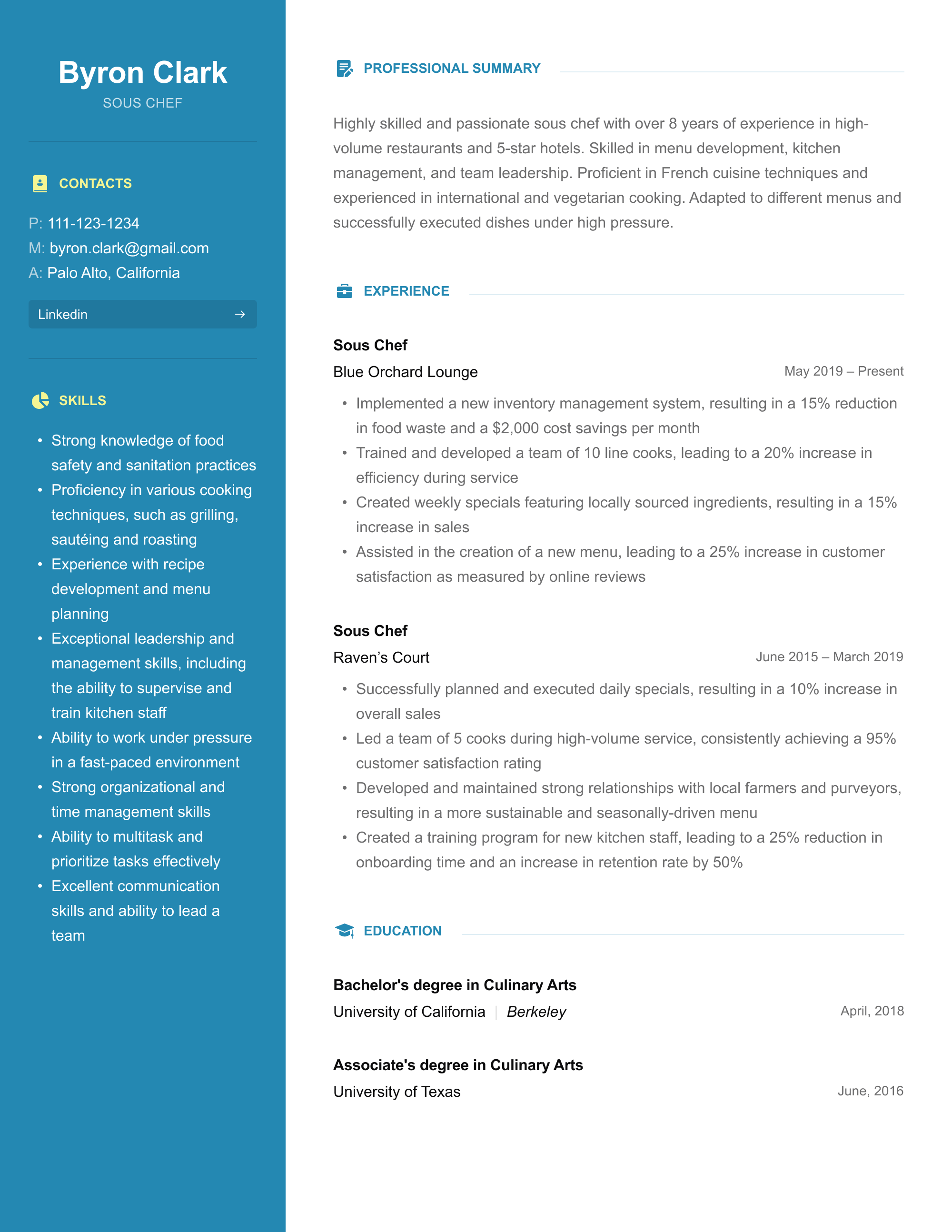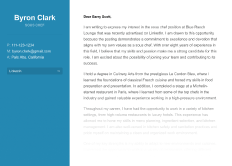Today's restaurant industry is fiercely competitive and expects those working in the field to maintain a high level of professional standards. Many establishments now offer specialized, or boutique, cuisines to edge out the competition.
Additionally, the fast-paced nature of the industry often requires culinary professionals to handle high levels of demand.
Sous chefs are among those experts that play a critical role in restaurants and are expected to be at the top of their game.
That's why recruiters take their time to hire the best of the best when they want to fill a sous chef position.
So, if you want to land a job as a sous chef, your resume has to embody the quality worthy of any five-star establishment.
This article provides all the tips and examples you need to impress your recruiter with your sous chef resume.
Who is a Sous Chef?
A sous chef is a culinary professional who is responsible for assisting the head chef in the day-to-day operation of the kitchen.
The sous chef is second-in-command, and they typically manage the kitchen in the head chef's absence.
As a sous chef, you are responsible for overseeing the preparation of food, managing the kitchen staff, and ensuring that health and safety standards are followed.
You're also in charge of managing inventory and ordering supplies as needed.
A sous chef is expected to be quick on their feet, have incredible leadership skills, pay attention to detail, have physical stamina, and be an excellent organizer. They're also expected to be creative, have flexibility, be passionate about food, and be problem solvers.
These are attributes that should appear on your sous chef resume if you want to impress the recruiter.
That said, you must also tailor your sous chef resume to the job you're applying for. That means understanding the wording in the job ad and using it to your advantage. Since most recruiters use
applicant tracking systems nowadays, you have to make sure you add relevant keywords.
So, for example, a resume for an experienced sous chef will be different from a resume for a prospective intern.
How Much Does a Sous Chef Earn?
A sous chef's salary can vary depending on a number of factors such as the type of establishment they work in, their level of experience, and the restaurant's location.
In general, sous chefs can expect to earn a higher wage than line cooks, but a lower wage than the executive chef.
According to data from
Salary.com
, the median annual pay for sous chefs in the United States is $50,001 in 2022. However, sous chefs in high-end restaurants or those with a great deal of experience may earn significantly more than this amount.
Source: Salary.com
The ideal
resume format
to use for the sous chef application depends on the job opening.
There are three main types of resume formats: chronological, functional, and hybrid.
- Chronological
: This is the most traditional and widely used format. It lists your work experience in reverse chronological order (most recent first). This format is a good choice if you have a solid work history in the culinary industry and want to emphasize your experience and career progression.
- Functional
: This format emphasizes your skills and achievements, rather than your work history. It is best if you have little to no experience as a sous chef, have gaps in your work history, or have held several jobs in different industries or positions.
- Hybrid
: The hybrid resume format is also called the combination format. This format combines elements of the chronological and functional formats. It lists your skills and achievements up front, followed by your work history in reverse chronological order. This format is best for people who have a strong work history and want to highlight their skills and achievements.
But which resume format should you use? We recommend using the chronological resume because it is the most common format and recruiters are comfortable with it.
The chronological resume is also easy to scan and ensures the hiring manager can skim through your resume to find what they're looking for.
Unless the job ad clearly states that the company is looking for an intern without experience, you should use a chronological resume. Recruiters almost always look forward to reading the experience section right after the resume summary.
Sous Chef Resume Example
How to Write Different Sections of the Sous Chef Resume
Like any
modern resume
, you have to divide your sous chef resume into different sections. These sections allow the recruiter to quickly scan the document to pick out specific information.
Your job is to use these sections to your advantage to show the hiring manager you're the type of chef they want.
Resume sections are different depending on the format you want to use. As mentioned earlier, you must tailor the resume to the job opening. That means the format you use must be in line with the details in the job ad.
For example, a functional resume will be ideal if the employer is looking for an intern.
Every resume has a header. It contains your name, contact info, and resume summary.
Start your resume with your name and avoid including "Resume" at the top as that is now considered outdated.
Your contact info should ideally contain:
- Your phone number
- Your email address
- Your address
- Your social media profiles
Don't use your full home address unless the recruiter specifically asks for it. Your email address should also look professional, containing your first and last names.
Since you're preparing a sous chef resume, it would be a great idea to include links to your professional social media pages where you showcase your culinary skills. These profiles could include Instagram, TikTok, and LinkedIn.
You should avoid adding your full residential address to the header as it is almost never required. Your city or state makes up enough information for the recruiter.
Write Your Resume Summary
To write an impressive sous chef resume summary, you need a strong introduction that summarizes your professional experience as a sous chef. This intro could be a brief overview of your career highlights or an explanation of your unique skills and expertise as a sous chef.
Include specific details about your responsibilities as a sous chef, such as managing a team of chefs, creating menus, and maintaining food safety standards.
Emphasize any relevant education or training you have received. You can use the summary as an opportunity to let the recruiter know you attended culinary school and tell them about professional certifications.
You can highlight notable awards or recognitions you have received throughout your career that are relevant to the position.
Additionally, make sure you use strong action verbs to describe your responsibilities and achievements, such as "created," “prepared,” "managed," or "implemented."
You should keep the resume summary concise and to the point, using no more than a few sentences to summarize your experience and skills.
If you don't have experience as a sous chef and are applying for a junior role, you have to use a resume objective instead.
In that case, you may want to focus on your passion for cooking and your willingness to learn and grow as a chef in your resume objective.
Make sure you tailor the resume summary to the job description. Since this section is short, select only the things you believe will grab the recruiter's attention.
Talented sous chef with years of experience and proven leadership track record. I'm an excellent communicator and team player and able to work under pressure. Seeking my next challenge as a sous chef in a reputable establishment.
Experienced Sous Chef with a culinary degree from Le Cordon Bleu and over 5 years of kitchen experience. Proven track record of implementing cost-saving measures, as demonstrated by reducing food costs by 15% at Blue Ranch Lounge. Skilled in menu development, inventory management, and kitchen safety. Strong leadership and communication skills, with a passion for creating innovative dishes.
How to Write the Experience Section
Your experience section should highlight your previous work experience as a chef, including your responsibilities and accomplishments. This can include leading a team of chefs, overseeing inventory and ordering supplies, managing the kitchen staff, creating menus, and cooking and preparing food.
You should list your experience in reverse chronological order, with your most recent position first.
Here are other things to note while writing the experience section:
- For each position, include the name and location of the restaurant, as well as your job title.
- In a few bullet points, highlight your key responsibilities and achievements in each role.
- Use action verbs to describe your responsibilities and achievements, such as "led," "implemented," "assisted," and "maintained."
- Mention notable recognitions, achievements, and/or awards you received at your previous workplace. Note that these achievements should be relevant to the position you’re applying for.
- Emphasize any experience you have with specific dietary restrictions, cooking techniques, and cuisines will also give you an edge.
- Use numbers and stats to show how effective you were. For example:
Here's a correct way to showcase your effectiveness in your previous role:
- Implemented a new inventory management system, resulting in a 15% reduction in food waste and a $2,000 cost savings per month
- Trained and developed a team of 10 line cooks, leading to a 20% increase in efficiency during service
- Created weekly specials featuring locally sourced ingredients, resulting in a 15% increase in sales
- Implemented food safety and sanitation practices to ensure and maintain compliance with local regulations
Here's the incorrect way:
- Leading a team of chefs in the preparation and execution of daily menus
- Developing new recipes and menus to drive customer engagement and sales
- Managing inventory and ordering supplies to ensure that the kitchen was fully stocked at all times
- Assisting the head chef with training and development of junior kitchen staff
- Maintaining a clean and organized kitchen to streamline food production
Keep your language concise and straightforward and use as few words as necessary. Aim for 3-5 bullet points per job, and avoid using flowery or overly complicated language.
How to Write the Skills Section in Your Sous Chef Resume
In most cases, writing the skills section goes beyond making a list of the skills that are most relevant to the sous chef position you are applying for.
You have to show the recruiter that you have those skills by explaining what they entail. You could also showcase how you used those skills in your previous roles.
Skills to add to the section include technical skills, such as proficiency in specific cooking techniques or knowledge of food safety regulations.
The section could also include soft skills, such as teamwork, communication, and problem-solving.
If you're using a chronological resume format, you should write your skills section in a list format. Here's an example:
Skills:
- Food safety and sanitation practices
- Grilling, sautéing and roasting
- French and Italian cuisines
- Recipe development and menu planning
- Ability to work under pressure in a fast-paced environment
- Organizational and time management skills
- Task prioritization skills
- Natural team-leading capabilities
However, if you're using a functional resume, use bullet points to list your skills within each category.
For each skill, provide a brief description of how you demonstrated or developed the skill in your past experiences.
Use specific examples and action verbs to make your skills stand out.
Keep the tone professional and concise. Aim for approximately 3-8 bullet points per category, and try to keep each bullet point to one line if possible.
Here is an example of what this section could look like:
Culinary Skills
- Used classical French cooking techniques, including sautéing, braising, and grilling.
- Skilled in the use of various kitchen equipment, including knives, ovens, and stovetops.
- Knowledgeable in food safety regulations and best practices, including proper handling and storage of food.
Management Skills
- Managed a team of 5-15 chefs and servers, ensuring that all dishes were prepared to the highest standards and in a timely manner.
- Implemented new systems for inventory management and food cost control, resulting in a 20% reduction in food waste.
- Developed and executed daily specials using seasonal ingredients, resulting in a 20% increase in daily sales.
Leadership Skills
- Led team-building exercises and training sessions for new hires.
- Assisted the head chef in the development of new menu items and specials.
- Worked closely with the front-of-house staff to ensure a seamless dining experience for guests.
Communication Skills
- Communicated effectively with team members and management to ensure a smooth operation.
- Worked with the head chef to plan and execute complex menus, including dishes for special dietary needs.
- Collaborated with suppliers and vendors to secure high-quality ingredients at competitive prices.
You don't need the elaborate skills section if you're using the chronological format. You should only focus on your skills if you don't have a work history and are applying for a junior role that doesn't require experience.
Writing the Education Section
The education section is another opportunity to show the recruiter you have the right training for the job. You should include relevant courses, degrees, and certificates.
If you don't have a degree, you can add training and certifications you've obtained.
Here are other tips on writing the Education or Qualifications sections:
- List your highest level of education first. If you have a degree in Culinary Arts or a related field, include the name of the degree and the school you attended.
- List your education and any relevant certifications and training in reverse chronological order, with the most recent items first.
- If you have any certifications, such as ServSafe or ACF certification, include them in this section as well.
- Include any relevant coursework or training that you have completed. This could include classes in cooking techniques, food safety, or culinary management.
- If you have any apprenticeships or internships, consider including them in the education section or creating a separate section for professional development.
You can add any reward you acquired or special program you attended while in school as long as they're relevant to the position and can boost your chances.
Should You Add Additional Sections to Your Sous Chef Resumes?
Including additional sections on your sous chef resume can be a good idea. Extra info can help you stand out and impress the recruiter, especially if they're in the market for an experienced and seasoned sous chef.
Some examples of sections you could consider adding include:
- Professional Development: This could include any culinary training or certifications you have received, such as a culinary degree or food safety certification.
- Acquired Skills: In this section, you can highlight any specialized skills or techniques you have mastered, such as proficiency in a particular cooking method or experience with a specific type of cuisine. You can also add any special training you may have undergone.
- Professional Affiliations: If you are a member of any professional organizations or associations related to the culinary industry, you can list them here.
- Awards and Accomplishments: If you have received any awards or recognition for your culinary skills or contributions to the industry, you can include them in this section.
Keep in mind that it's important to tailor any additional section to the specific job you are applying for. You may not need to add all the extra info depending on the position and requirements of the recruiter.
Conclusion
A great sous chef resume is your way in and your first real chance to impress the recruiter. While the recruiter will test you further, it's the resume that helps you scale to the next phase of recruitment. So, make sure you carefully prepare the document, proofread it to eliminate errors and keep it scannable to guide the hiring manager.
Sous Chef cover letter
An ideal resume is a combination of content that would allow you to stand out and format that is
ATS-friendly, neat and comfortable to read. Learn more about writing the perfect resume here, and be sure to
check out expert tips on creating an effective Sous Chef cover letter to go with your resume.
Go to cover letter
Alex Miller is a writer, editor, and HR manager who specializes in education and counseling. He was born in Slovenia and moved to the USA as a teen. Alex loves to travel and explore old towns. He is passionate about psychology, literature, and good food.




